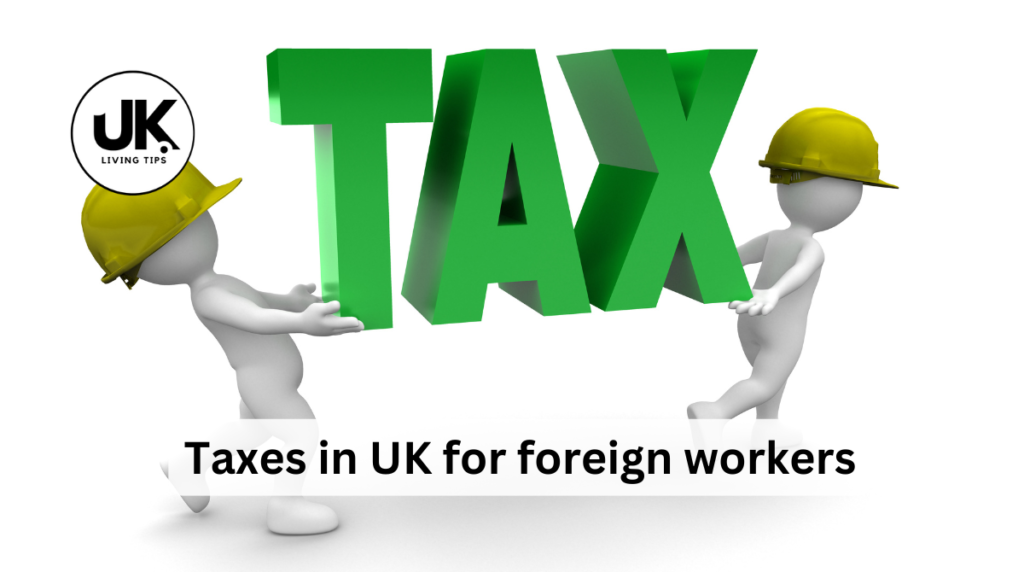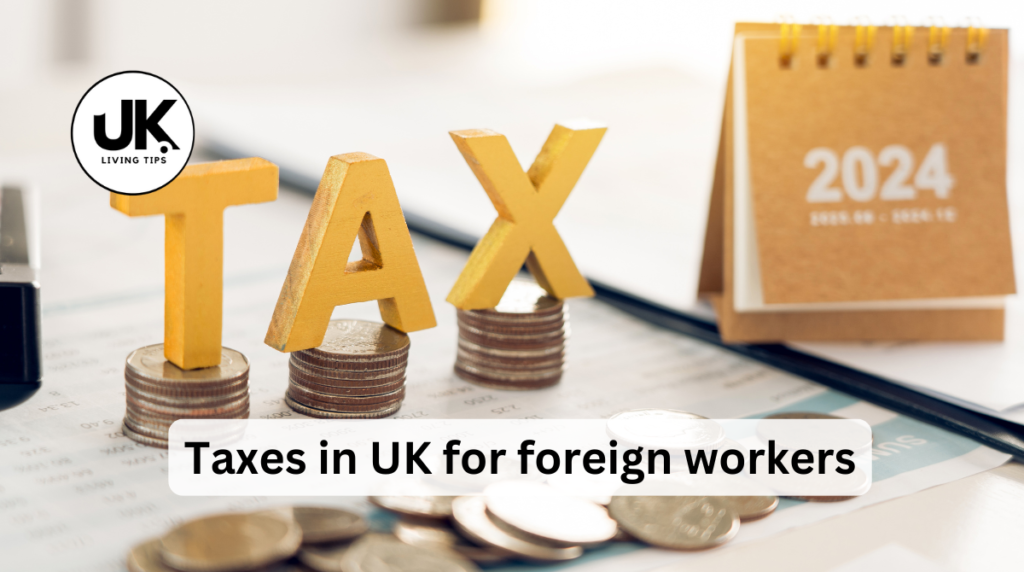Welcome to UK Living Tips, Article we are going to talk about, Taxes in UK for foreign workers 2025: Hey there! If you’re a foreign worker in the UK or planning to move there for work, understanding the tax landscape can seem a bit overwhelming. But don’t worry—we’re here to simplify things for you. In 2024, there are a few key types of taxes you’ll need to be aware of. Let’s break them down!
Taxes in UK for foreign workers
So, you’ve landed a job in the UK – congratulations! It’s an exciting time, full of new opportunities and experiences. But along with settling into your new life, you’ll need to get to grips with the UK tax system. Don’t worry, it’s not as complicated as it might seem. This article aims to demystify the process and provide you with the essential information you need to understand your tax obligations.
Overview
The Basics: Who Needs to Pay UK Tax?
The first question you likely have is: “Do I even need to pay UK tax?” The answer generally depends on your residency status. Here’s a simplified breakdown:
- UK Resident: If you’re considered a UK resident for tax purposes, you’re generally liable to pay UK tax on your worldwide income. This means any income you earn, whether it’s from your UK job or investments abroad, may be subject to UK tax.
- Non-UK Resident: If you’re not considered a UK resident, you’ll typically only pay UK tax on income sourced within the UK. This mainly means your earnings from your UK employment.
Calculate your Tax in the UK: Click Here
How Does Residency Work for Tax?
Residency for tax purposes isn’t as simple as just where you live. HMRC (Her Majesty’s Revenue and Customs, the UK’s tax authority) uses a complex system called the Statutory Residence Test (SRT) to determine your residency status. The SRT has three main parts:
- Automatic Non-Residence Test: If you meet any of these criteria, you are automatically deemed non-resident:
- You spent fewer than 16 days in the UK in a tax year (April 6th to April 5th).
- You were resident in the UK in any of the three previous tax years and spent less than 46 days in the UK in the current tax year.
- You work full-time overseas.
- Automatic Residence Test: If you meet any of these criteria, you are automatically deemed resident:
- You spent 183 days or more in the UK in a tax year.
- You have a home in the UK, where you spend all or most of your time, and have spent 30 or more days in the UK during the tax year.
- You work full-time in the UK.
- Sufficient Ties Test: If you don’t meet the automatic tests, this test considers your connections to the UK to see if you are a resident. Factors such as family ties, accommodation available for your use, whether you carry out work in the UK and your days spent in the UK are all considered.
Understanding the SRT is key to determining your tax obligations. You can find more details and tools on the HMRC website to help you assess your individual circumstances.

What Taxes Will You Likely Pay?
As a foreign worker in the UK, you’ll likely encounter these main types of taxes:
- Income Tax: This is the tax you pay on your earnings. It’s deducted directly from your salary through the PAYE (Pay As You Earn) system. Your employer is responsible for taking income tax and National Insurance contributions from your salary.
- National Insurance: These contributions go towards funding the UK’s state benefits system, including pensions and healthcare. Like income tax, National Insurance is automatically deducted from your paycheck.
- Council Tax: This is a local tax used to fund local services like rubbish collection, libraries, and street lighting. You pay council tax based on the valuation band of your property, and this will be dependent on your area. If you rent, check your tenancy agreement, often the council tax is included, but you will need to contact the local council to register.
- Capital Gains Tax (CGT): If you sell assets such as shares or property at a profit, you may have to pay CGT. However, CGT is likely only something you would encounter should you have assets that increase in value while you are in the UK. If you have assets outside of the UK, you may have to declare these, even if you do not pay CGT on them to HMRC.
Understanding Tax Codes
When you start working in the UK, you’ll receive a tax code. This code tells your employer how much income tax to deduct from your pay. Tax codes are usually made up of numbers and letters, with the most common being “1257L”. This means that the individual can earn £12,570 before paying income tax, this is the UK’s personal allowance for the tax year (2024/2025). You can claim this allowance as a foreign worker, however, you will need to make sure to make HMRC aware of your UK residency. If your tax code is incorrect, it is your responsibility to contact HMRC to correct it.
Income Tax Rates and Bands
The UK uses a progressive tax system, which means that the more you earn, the higher the tax rate you pay. These tax bands are subject to change every tax year, below are the rates for England and Northern Ireland for the 2024/2025 tax year:
- Personal Allowance: £0 to £12,570 is taxed at 0%.
- Basic Rate: £12,571 to £50,270 is taxed at 20%.
- Higher Rate: £50,271 to £125,140 is taxed at 40%.
- Additional Rate: Over £125,140 is taxed at 45%.
Scotland has its own income tax bands, as well as higher tax bands that will impact high earners. It is worthwhile noting that you will pay tax based on where you are a resident, not where you may work, so be aware of your residency when calculating your income tax liabilities.
National Insurance Rates
National Insurance rates also depend on your income bracket and employment type. Generally, employees will pay at these rates (for the 2024/2025 tax year):
- Primary Threshold: £0 to £12,570 per year: 0%
- Above the Primary Threshold: £12,570 and above: 8%
How to Pay Taxes
For most foreign workers, taxes will be deducted automatically through the PAYE system. This is usually handled by your employer, making things simpler. However, you might need to submit a self-assessment tax return in some circumstances, such as if you have income from other sources.
Important Tips for Foreign Workers:
- Get a National Insurance Number: You’ll need a National Insurance number to work in the UK and pay taxes. You can apply for this online, and it is a straightforward process.
- Register with HMRC: Make sure you’re registered with HMRC so they can send you important tax information. This will happen automatically when you receive your National Insurance number.
- Keep Records: Keep all your payslips and tax documents safe, as you may need them later for self-assessment, tax refunds, or even when leaving the UK.
- Seek Professional Help: If you find the UK tax system confusing, don’t hesitate to consult a tax advisor. They can provide tailored advice and ensure you’re meeting all your obligations correctly. There are many great tax advisors that specialise in foreign worker tax matters.
- Understand Tax Treaties: The UK has tax treaties with many countries to prevent double taxation. These treaties can impact how your income is taxed if you have earnings in your home country.
Common Misconceptions About UK Taxes for Foreign Workers
- “I’m not a UK citizen, so I don’t need to pay tax.” Residency, not citizenship, is the key factor. If you are deemed a UK resident for tax purposes, you will be subject to tax, regardless of your citizenship.
- “My employer handles everything, so I don’t need to worry.” Your employer handles the PAYE deductions, but it’s still your responsibility to ensure your tax affairs are in order.
- “I only need to worry about the tax year of my arrival.” Once you become a UK resident for tax purposes, you will need to worry about tax for every tax year until you become a non-resident.
Conclusion
UK tax system as a foreign worker might seem a bit daunting initially, but understanding the key principles of residency, tax codes, and the different types of taxes will make things easier. By staying informed, keeping good records, and seeking advice when needed, you can confidently manage your tax affairs in the UK and fully enjoy your time here.
Remember, this is a general guide, and individual circumstances may vary. Consulting a tax professional is always a good idea if you have specific questions or complex financial situations. Welcome to the UK, and here’s to a successful and tax-compliant stay!


